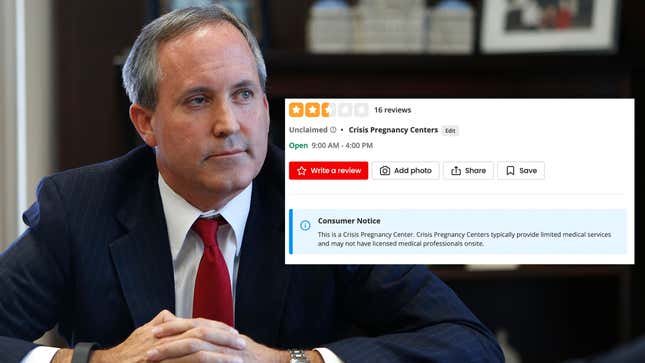
It’s a big day in Texas for suing and getting sued: The state of Texas, represented by embattled state Attorney General Ken Paxton (R), and Yelp, are mutually suing each other over a helpful feature on Yelp’s website that was added after Roe v. Wade was overturned, and informs users that anti-abortion crisis pregnancy centers don’t provide abortion services.
Yelp first sued Texas in a district court in San Francisco, California, on Wednesday, calling the action preemptive as Paxton allegedly warned the company last week that it planned to sue as soon as Friday. And, right on schedule, Paxton filed a suit against Yelp on Thursday in Bastrop County Court in Texas, claiming the company violates the Texas Deceptive Trade Practices Act for “inaccurate and misleading language” with its labels. Yelp’s suit calls on the court to affirm that its labels are constitutionally protected speech.
Currently, Yelp labels anti-abortion centers with the objective fact: “This is a Crisis Pregnancy Center. Crisis Pregnancy Centers do not offer abortions or referrals to abortion providers.” Last August, when Yelp first added the labels in the wake of the Supreme Court overturning Roe, they described anti-abortion centers as “typically provid[ing] limited medical services and may not have licensed medical professionals onsite.” After backlash from state attorneys general in February, Yelp changed its label to the current one. And, as Yelp points out in its lawsuit, Paxton previously characterized the new labels on anti-abortion centers as “accurate” in a February press release.
It’s not clear what changed on Paxton’s end, but by Thursday, the aggressively anti-abortion AG accused Yelp of “deceptively [disparaging] facilities that counsel pregnant women instead of providing abortions” in a statement, adding, “Major companies cannot abuse their platforms and influence to control consumer’s behavior, especially on sensitive health issues like pregnancy and abortion.” I’m rarely shocked by how awful Texas Republicans are anymore, but it feels especially egregious to pretend to be concerned about “sensitive health issues like pregnancy and abortion” while banning abortion and jeopardizing the lives of women and pregnant people in a rash of horrific cases.
Yelp’s labels, which the company says are manually added after thorough vetting, are important because anti-abortion centers purposefully present as abortion clinics, often setting up shop right next to or near real clinics. These fake clinics typically advertise free services and resources with the specific goal of attracting low-income pregnant people. Once pregnant people enter anti-abortion centers, they’re typically bombarded by lies, including that abortion can cause infertility and cancer (false), that a medication abortion can be reversed (unproven), and that abortion kills babies (also false!). People who have been victimized by fake clinics have recounted being forced to pledge not to have an abortion in order to leave the premises, while others say they were called, stalked, and harassed by anti-abortion centers for prolonged periods of time after their visits. Anti-abortion centers and their digital hotlines also collect and store extensive patient data—and the many that aren’t licensed medical providers aren’t subject to medical privacy laws like HIPAA.
For years, search engines like Google have helped amplify anti-abortion centers and, until fairly recently, allowed them to appear without a disclaimer. Yelp’s labels are a vitally important first step: “Often, people think of Yelp and think of restaurants, but it’s a source that a lot of people go to when they’re looking at all sorts of different businesses and services,” Shireen Shakouri, deputy director of Reproaction, told Jezebel last year. Shakouri noted that for years, abortion rights advocates have taken it upon themselves to leave Yelp reviews on anti-abortion centers specifying that they’re “fake clinics,” and said Yelp’s labels “add an important layer of trust.”
Yelp didn’t immediately respond to a request for comment from Jezebel on its mutual lawsuit against Texas, but in a statement announcing the labels last year, the company said the “trust and safety of our community is a top priority,” as is “access to reliable information about reproductive health services.” Last April, Yelp also offered to help fund abortion-related costs and travel for employees impacted by bans—but, like other companies, only did so after historically donating to anti-abortion candidates.
Ironically enough, Texas’ legal war with Yelp comes as Gov. Greg Abbott (R) told Bloomberg this week that his abortion ban hasn’t impacted business in the state. Yet, here Texas is, battling it out with the company behind perhaps the biggest online directory in the world.